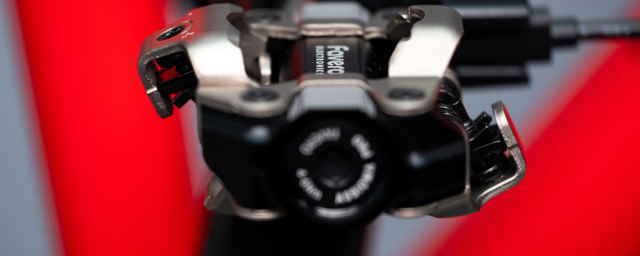Smart suspension becomes reality with Fox's Live Valve technology

It looks like the era of genuinely adaptive suspension is set to land with a rather polished version of Fox's long-awaited Live Valve automatically adjusting suspension system spotted on a Scott Genius at the Eurobike trade show.
- Your complete guide to the RockShox fork range
- Best mountain bikes for under £1000- best budget options ridden and rated
- 11 tools every home bike mechanic should own
Fox has had the Live Valve system in development for a number of years and the general principle has remained the same throughout, namely that it uses linked sensors on both the fork and rear swingarm to sense impacts and adjust suspension setting to suit. Fox is tight-lipped on the exact details but we imagine that the system will drastically stiffen the suspension for more efficient pedalling but be able to unlock it automatically when you hit rough trails.
What sets this system apart from other automatic lockout systems we've seen in the past, such are Lapierre's E:I electric lockout or Specialized's inertia valved 'Brain' shocks, is that the Fox system was always designed to react fast enough to be genuinely adaptive rather than reactive - and for both front and rear shocks.
The basic idea is to use a pair of sensors - accelerometers, most likely - readings from which can be compared to judge whether something is trying to compress the suspension from below (like a bump) or above (such as rider-induced pedal bob). After these inputs are processed, servo motors driven by a battery pack adjust damping on-the-fly. It looks very much like only compression damping is affected, with an external adjuster allowing you to tune how hard or soft the suspension is - we assume this is for the lockout mode.
At the front, there's a sensor on the fork crown and the fork brace, but it's a bit more complicated for the rear shock as the bump needs to be measured at the swingarm. We've seen a few bikes with ports for the Live Valve sensor, wiring and battery on them - Pivot's Mach 5.5 launched over a year ago for example - but the fact that we've not seen the system fitted to a production bike until now suggests that this probably wasn't a particularly easy birth. That's not surprising given the complexity of the system - especially as it needs to be reliable and affordable enough for mass production.
We imagine that the system requires quite a bit of juice to do both the computing and then power the servos fast enough to react in fractions of a second, so the battery will probably be a fairly substantial item - what's fitted to this Scott is apparently just a cover, so we don't know what it'll really look like.
We're sure that more details will be forthcoming from Fox soon anyway, but it looks like a really interesting development and one we're hugely keen to test out...

















